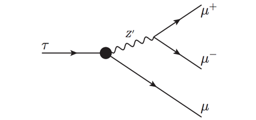The world’s community of machine learning data scientists organizes “Kaggle” competitions to solve the most difficult and interesting challenges in different fields. This year, for the first time, a competition has been proposed by the LHCb experiment. The aim of the exercise was to establish the best way of looking for a phenomenon that is not (yet?) known to exist – the decay of a tau (τ) lepton into three muons μ’s, denoted τ → μμμ. This decay is forbidden in the Standard Model of particle physics and therefore its observation would indicate a discovery of “new physics”, which is now the key goal of the LHC. The awards of this competition were announced today at the Applying (machine) Learning to Experimental Physics workshop organized in the framework of the Twenty-ninth Annual Conference on Neural Information Processing Systems.
Machine (computer) learning is widely used in particle physics in order to select a small number of interesting candidates found in individual collisions, called by physicists “signal events”, among often a large number of uninteresting events called “background”. Some machine learning algorithms are inspired by biological neural networks. They are used to estimate functions that can depend on a large number of input information supplied by physicists, which is different for the signal and background events. The model then “learns” from the simulated signal and background events what the best criteria to separate them are. An output function is then generated indicating if the experimentally measured events look more or less like the signal or background events. Currently the most popular machine learning algorithm used in particle physics is called a “Boosted Decision Tree (BDT)”, see for example, its use in the Bs→ μμ decay observation paper.
673 teams took part in the competition from all over the world. They worked with real data from the LHCb experiment mixed with the simulated data of τ → μμμ decays. The solutions presented by the winning teams were presented at the workshop. The LHCb collaboration have offered also two physics prizes for the most useful solutions for their analysis. The winners will be invited to the Heavy Flavour Data Mining workshop in Zurich in February 2016. The prizes were sponsored by Yandex and Intel.
The competition may allow LHCb physicists to learn some computing tricks from the machine learning community. This community, on the other hand, may possibly have improved their skills by having tackled this very challenging particle physics challenge.

